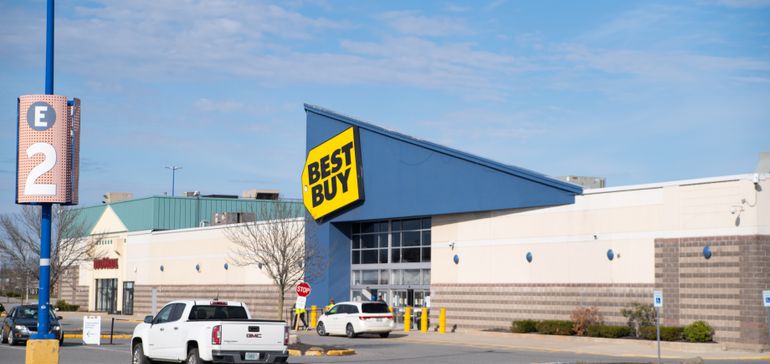[ad_1]
Dive Brief:
-
Best Buy on Wednesday joined other retailers in lowering its guidance in key metrics, saying that demand for electronics has tempered. The retailer now expects Q2 comp sales to fall about 13%, versus 19.6% comp growth a year ago, and for the operating income rate to be about 3.7%, per a company press release.
-
In May, Chief Financial Officer Matt Bilunas had said that while the retailer was no longer providing quarterly guidance, its expectations for Q2 at that time were in line with its Q1 results of an 8% comp decline and a nearly 40% operating income decline.
-
For the year, the company expects about an 11% comp sales decline, steeper than its previous expectation for a 3% to 6% decline, and about a 4% operating income decline, a recovery from its previous estimate for a 5.2% to 5.4% decline.
Dive Insight:
For the last few months, electronics sales have fallen compared to last year, following robust sales during the pandemic, when many consumers upgraded items in their homes, watched a lot of television and benefited from the federal government’s financial support.
Best Buy CEO Corie Barry said in a statement that the retailer expected demand to ebb to some extent, but that inflation has made things worse.
“As we’ve said, we entered the year expecting our fiscal 2023 financial results to be softer than last year as we lap government stimulus support and unusually strong consumer electronics industry demand while we continue to invest in our future,” she said. “As high inflation has continued and consumer sentiment has deteriorated, customer demand within the consumer electronics industry has softened even further, leading to Q2 financial results below the expectations we shared in May.”
There are some signs the retailer can weather this storm. Best Buy said that it will end the second quarter with inventory flat to last year. This indicates strong inventory management, so the retailer “probably won’t need to discount as aggressively as others in the back half,” UBS analysts led by Michael Lasser said on Wednesday.
Best Buy on Wednesday also said that its Q2 revenue will be about 7.5% higher than the second quarter of 2019, and UBS noted that, unlike at grocery stores and mass merchants, little if any of that sales bump is due to inflation. Still, Best Buy has probably lost share in the category and has been forced to discount as consumers did more one-stop shopping at mass merchants, UBS also said.
Pressures are likely to remain for the foreseeable future, in part due to the nature of demand for consumer electronics, analysts said. Many products are long-lasting, so people don’t buy them that often, even in a good year. And because many are big-ticket items, people tend to buy when their finances are healthy and the economy is good — not at a time, like now, of uncertainty and looming recession.
“All of this will have a negative impact on Best Buy’s bottom line. The costs of business are higher than they were, and investment is still needed in things like new store formats and in the online ecosystem,” GlobalData Managing Director Neil Saunders said in emailed comments. “However, without higher sales these things will create a bigger hole in the bottom line.”
The retailer’s advantages include effective management, a customer-centric focus and omnichannel chops, according to Saunders.
“However, this is clearly going to be a very lean year for one of the darlings of the sector. Like Walmart, Best Buy is signaling that times have changed in retail – and they have changed for the worse,” he said.
[ad_2]
Source link








